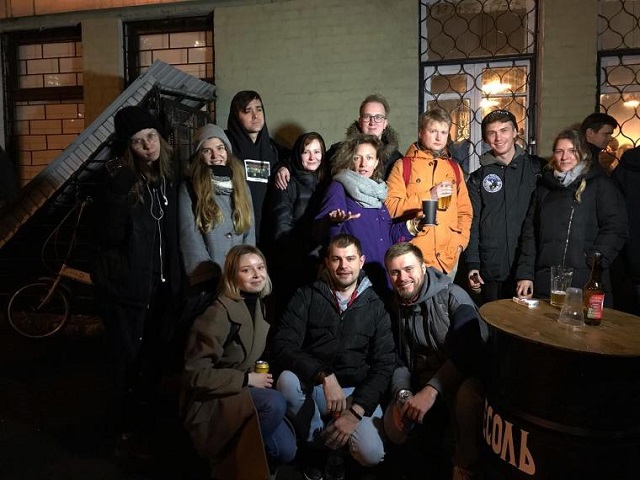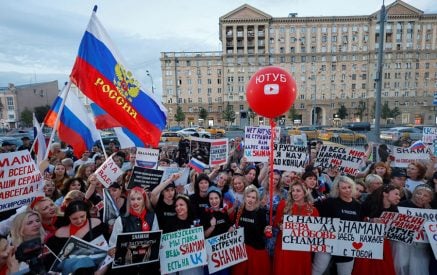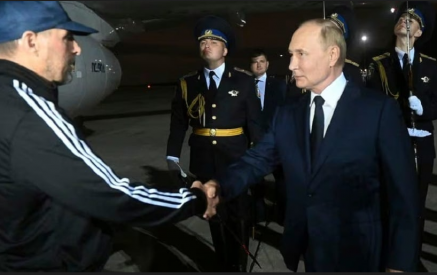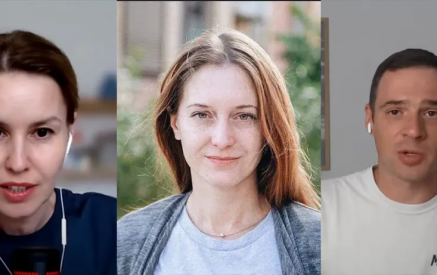By Elena Rodina, Europe and Central Asia Research Associate
Of the more than 100 Russian journalists who have been arrested or fined covering rallies in support of jailed opposition leader Alexei Navalny, Mediazona chief editor Sergey Smirnov has become a symbol of the absurd lengths to which Russian authorities are willing to go to quash coverage of the events.
On January 20, Smirnov retweeted another person’s tweet saying the editor looked like a punk musician from the band Tarakany, or Cockroaches, in an advertisement for a January 23 pro-Navalny rally. The tweet was an inside joke — a reference to a past incident in which a pro-state Telegram channel misidentified a photo of a Russian rapper as Smirnov, Smirnov’s colleague Yegor Skovoroda told CPJ.
Ten days later, on January 30, Russian police arrested Smirnov; on February 3, he was sentenced to 25 days in prison on charges of “repeatedly violating the rules for holding public events” because of the retweet. At his first court hearing, Smirnov wore a T-shirt with the name of the punk band from the offending tweet – Cockroaches. On February 8 the sentence was reduced to 15 days.
Read also
Smirnov’s defiant humor is par for the course at Mediazona. The outlet is a journalistic phenomenon in Russia. Founded by members of feminist punk group Pussy Riot in 2014 with a focus on the prison system, it has grown into one of the most influential independent news websites in the country covering a range of criminal justice issues. In the spring of last year, Mediazona counted six million page views per month, according to the website’s technical director Ksenia Zhivago, who spoke with CPJ via messaging app.
CPJ spoke with Mediazona editors Skovoroda and Dmitry Tkachev, via phone and a messaging app, about Smirnov’s arrest, the reasons for Mediazona’s growing popularity, and how the editorial staff maintains its sense of humor amid pressure from authorities and while covering difficult topics. Their answers have been edited for length and clarity.
You were both with Smirnov when he was arrested. What happened?
Dmitry Tkachev: A few days before Smirnov’s arrest, his mother’s apartment was searched, although he has not lived there for a long time. They seized a hard disk and several books on the history of the dissident movement and the KGB — not some kind of banned literature, but books that had been legally bought in stores. It appeared as if a screenwriter with a bad imagination composed a drama from the life of Soviet dissidents in the ‘70s.
At the same time, mass searches of many of Navalny’s associates and activists were ongoing in Moscow, targeting people who either called for rallies or were suspected of doing so by security officials. They were investigated on criminal charges of “calling for a violation of the coronavirus quarantine.” Against this background, that search [of Smirnov’s mother’s apartment] looked very alarming.
The day of Smirnov’s arrest was a day off, and he was going for a walk in the middle of the day with his little son, Andrey, to a park not far from his house. Skovoroda and I decided to keep them company.
We only reached the corner of the house, when four policemen in black uniforms and bulletproof vests and one in civilian clothes ran up to us, and said, “Sergey Sergeyevich, you are being detained in connection with an unauthorized rally.” We tried to explain that he could not leave the child, but they still decided that the child should be left with us. Smirnov was searched, put into the police bus, and they drove away.
Yegor Skovoroda: At the police department, the police talked all the time about Smirnov’s participation in the [January 23] action, which was completely absurd — he did not participate in it in any way, neither as a protester nor as a journalist. He sat at home all day, working behind a computer. And only in the evening it became clear that they came up with that insane case of a retweet of a joke.
The trial [on February 3] was burdensome and absurd. Smirnov was slapped with 25 days of imprisonment [now reduced to 15] and taken to Sakharovo [The Foreign Citizen Temporary Detention Center in the village of Sakharovo outside Moscow]. It’s a deportation center for illegal migrants, which they used because all the detention centers in Moscow were overflowing with the people arrested at the protest rallies. The center has awful conditions.
[Editor’s note: In response to emailed questions about conditions at the Foreign Citizen Temporary Detention Center, a representative with the Ministry of Internal Affairs of Moscow directed CPJ to a report on its website about the lack of overcrowding in the facility. The Ministry of Internal Affairs of the Russian Federation and the Moscow city court did not respond to CPJ’s emails seeking comment about Smirnov’s case.]

Sergey Smirnov wears a shirt from the Cockroaches band at a February 3, 2021 court hearing regarding his January 30 arrest. (Mediazona)
Tkachev: I think that in the minds of the law enforcement officials, a certain transference took place. They came to think that if Mediazona constantly writes about protest rallies, about those detained at rallies, about violation of their rights, and about police violence, it means that it somehow sympathizes with the people who go to the rallies, and since it sympathizes with them, it is with them, and all of them belong to one organization. And I believe that, due to [officials’] complete lack of understanding of what mass media is, we ended up on some “list of the enemies.”
Let’s go back to when Mediazona was founded in 2014. How did the project start?
Tkachev: After Putin was re-elected for a third term in 2012, it became clear that he [would be in power] forever, and major media conglomerates began censoring themselves. Journalists began to look for opportunities to do what they see fit in smaller, niche media. One of them was Mediazona, founded by members of Pussy Riot after their release [from prison in 2013 after serving 22 months on charges of “hooliganism” for a performance critical of Putin].
Masha [Maria Alyokhina] and Nadia [Nadezhda Tolokonnikova] wanted to create a news outlet about the situation in prisons. It was their personal experience and pain, they went through prison and wanted to tell the public about what was happening inside the penitentiary system and to try to change that system. At first, there were only four journalists in the editorial office, and everyone took turn writing news, including the editor-in-chief, Sergey Smirnov.
How did the project go from a niche outlet to one of the main independent Russian news websites?
Tkachev: The growth of Mediazona’s audience is not as much on our merit as that of Vladimir Vladimirovich Putin. The stronger his personal power becomes, the more it irritates a certain part of society. The longer he reigns and the more often state TV says that Russia is flourishing under his wise leadership and the West will soon fall into hell, the more frustration grows and the more any alternative [news source] becomes attractive. We offer a rather radical alternative.
What is also important is that we do not only write about political prisoners. We are saying that any person in Russia, if they do not belong to the privileged class, is absolutely powerless and defenseless in the face of the police and judicial system in Russia. We write about this, and also about how, when people really need police protection — for example, victims of abuse, or of racially motivated crimes — the police are inactive.
This is not a secret for anyone in Russia — everyone knows this since childhood. But it is not customary to talk about it, because this state of affairs is considered to be natural and unchanging. When someone in Russia begins to resent or protest against this state of affairs, this person is considered either a naive fool who does not understand how everything works, or an egoist who demands privileges for himself. Mediazona from the very beginning called this state of affairs abnormal.
What, in your view, were some of the most impactful Mediazona stories, and which were the most difficult to work on?
Skovoroda: There were two texts that were the hardest to work on, psychologically. First, together with the [Russian human rights group] Committee Against Torture — we worked on a publication about ordinary people who had suffered from police torture. It’s always hard to talk to people who have experienced such terrible violence. A year after that, we published a similar article; that time we spoke with the relatives of the victims of torture — somehow, this was even more difficult to listen to, the pain that these relatives felt, and how they later tried to achieve justice, most often in vain.
Tkachev: For me, one such story requires a little preliminary explanation. Russian laws allow a person to be tried posthumously. In the North Caucasus, a court found a young man posthumously guilty of attacking an elderly couple; he allegedly broke into their house with an ax, then stumbled, fell on that ax, and died. The investigation of that case showed that, with a high degree of probability, that man was killed by a policeman, who then, together with his partner, staged a robbery, brought the corpse to [the policeman’s] parents’ house, and persuaded them to give false testimony by saying that the victim allegedly attacked them.
The parents of the unjustly convicted deceased young man tried to establish some kind of truth and insisted on a forensic examination of the man’s head – apparently his head had some bullet marks. But then the morgue where the forensic examination was taking place simply lost his head. And for several years his father was trying to get his son’s head returned to him.
Very often, our protagonist is a common person who is deprived of education, money, has no acquaintances among the establishment. When standing face to face with the security forces, this person cannot tell one’s story clearly, nor defend oneself, has no access to lawyers, and is doomed. In a sense, the ethos of Mediazona, no matter how naive it may sound, is to give a voice to such people.
How does your team address the psychological health of journalists working on stories like this?
Tkachev: We have a psychologist who sometimes consults people in the editorial office individually, and, if necessary, acts as a moderator at the general meeting of the editorial board. We once went to a retreat with the whole editorial office and wandered through the woods for a week, trying to minimize the use of gadgets. In general, of course, burnout is terrible.
Although if someone sees the work chat of Mediazona, it might appear as if we are giggly teenagers who endlessly tease each other, exchange silly memes and turn any serious conversation into a tournament of off-color jokes. This helps, although it probably looks awful from the outside – probably, not unlike the humor of oncologists.
Has Mediazona been censored?
Tkachev: When we talk about censorship in Russia, more than half of the cases are examples of self-censorship. There is no Kremlin emissary who sits in the newspaper office and checks all the articles. But the owners of the large media conglomerates do not want problems with the authorities — they understand that their business can be taken away at any time, so they insure themselves, control journalists, and establish unspoken rules that cannot be violated. We do not have such owners, and this is a huge plus.
Russia under Putin is more a kingdom of conformism than of terror. But there are exceptions, of course. There are topics that are really dangerous to touch upon.
Like what?
Tkachev: It is pleasant to imagine Putin’s Russia as classical totalitarianism, as the degeneration of the Stalinist USSR, in which every bureaucrat is subordinated to a single central will emanating from the Kremlin or from Lubyanka [the Moscow headquarters of the Russian security service], but this is not so. We are dealing with a regime of a different type, in which each official, civilian or in uniform, serves some private interests — corruption, family, clan, sometimes simply criminal.
And therefore, very often the actions of these people are completely impossible to predict on the basis of some broader political situation. They fulfill Putin’s will when it is personally beneficial to them. Roads are built only if something can be stolen in the process, wars are fought only if they lead to the enrichment of some strange shadowy military companies.
Everyone thinks that in Russia, it is very dangerous to criticize Putin and the special services, but it is much more dangerous to get on the wrong side of some small caliber clerk, official, or gangster (and sometimes it is hard to distinguish one from another) in their small, private interests. And if one does that, that’s when they really break heads, burn cars, kill. You do not know which protagonist of your article will fly off the rails and move on to violent action, unlike centralized political repression, which is subject to some general logic of the regime, and thus can be predicted.
This does not negate, but only complements the well-known fact that in Russia all topics that can be perceived as a personal insult to Vladimir Vladimirovich Putin are taboo. His family, his property, his past, his friends — all these topics are best avoided. The country is run by a vindictive, resentful man, he does not like to be laughed at, and doesn’t like when someone touches upon his personal life. All this is clear from the example of Alexei Navalny and his latest film [a widely-viewed video investigation alleging that Putin built a castle with illegal funds, which the Kremlin denies].
Skovoroda: Until recently, there was a general understanding that if you write about the president and his closest circle, you are looking for their villas, where they hide their money, this almost 100% meant that there would be problems for the outlet. And now it seems that they are adding to these topics everything that is related to protests, repressions, and Navalny. There is a feeling that they have learned from Belarus, where after the protests they began to persecute journalists, believing that they provoked these protests and are associated with them.
Did state authorities pressure Mediazona before Smirnov’s arrest, and do you predict any future pressure?
Tkachev: Until recently, everything has been limited to minor problems with Roskomnadzor [the state media regulator, which in late 2020 ordered Mediazona to remove an article on COVID-19 in prisons because it contained “untruthful” material].
These laws are constantly changing. Now Roskomnadzor can fine you for obscene language, for example, and when you publish interviews with prisoners, it is difficult to do without it; or for mentioning banned extremist organizations without a special stipulation that they are banned for extremism. We have always treated this department with humor — as an annoying, but not dangerous insect, although after several warnings from Roskomnadzor the website may be blocked.
But then our publisher Pyotr Verzilov was poisoned with an unknown substance [in September 2018 according to his allegations and the suspicions of German doctors]. He spent two weeks between life and death. We still do not know whether this attempt is connected with Mediazona or not. And then our editor-in-chief Sergei Smirnov was jailed… Let’s see what will happen next.
[Editor’s note: CPJ emailed the press service for Putin for comment about allegations of corruption, restrictions on the press, and the alleged poisoning of Verzilov, but did not receive a response. CPJ also emailed the press service of Roskomnadzor but did not receive a response.]
Committee to Protect Journalists
Main Photo Caption: Mediazona employees at a Moscow bar in 2019. CPJ spoke with editors Yegor Skovoroda (right, in the orange jacket) and Dmitry Tkachev (not pictured) about the news outlet and the January 30, 2021 arrest of chief editor Sergey Smirnov. (Gala Latygovskaya)


























































